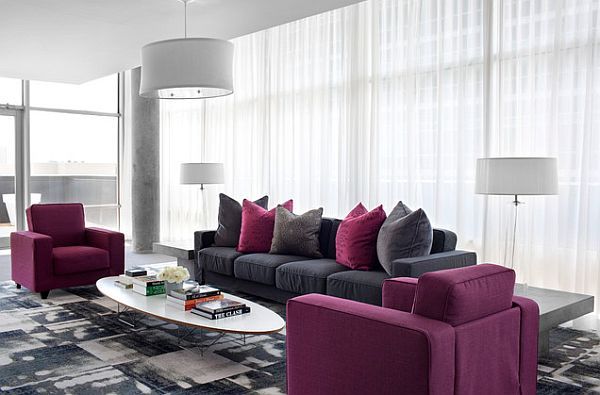Unlocking the Power of Gray Walls: The Ultimate Accent Color Guide
Gray walls have become a staple in modern interior design, offering a versatile backdrop for a wide range of styles. But with this versatility comes a crucial question: what accent colors truly complement gray walls and bring a room to life? This exploration delves into the art of pairing accent colors with gray, providing a comprehensive guide to transform your space.
Choosing the right accent color can dramatically impact the overall mood and aesthetic of a room. From vibrant pops of color to subtle, sophisticated shades, the options are endless. This guide will help you navigate these choices, considering factors such as the shade of gray, the room's purpose, and your personal style.
The popularity of gray walls stems from their neutrality and adaptability. Gray serves as a blank canvas, allowing accent colors to take center stage and create a personalized atmosphere. Whether you're aiming for a calming retreat or a vibrant, energetic space, the right accent color can make all the difference.
Understanding the undertones of your gray walls is key to selecting harmonious accent colors. Cool grays with blue or purple undertones pair well with jewel tones and cooler shades, while warm grays with brown or beige undertones complement earthy tones and warmer hues. Identifying these undertones will guide your color choices and ensure a cohesive design.
Beyond simply aesthetics, the psychology of color plays a crucial role in how we perceive a space. Warm colors like yellow and orange can evoke feelings of happiness and energy, while cool colors like blue and green promote relaxation and tranquility. Consider the desired mood for each room when choosing your accent colors.
Historically, gray has been associated with sophistication and elegance. Its use in interior design has evolved over time, becoming increasingly popular in contemporary styles. One of the main issues when decorating with gray is the potential for a room to feel flat or lifeless without the strategic use of accent colors.
For example, a light gray living room can be enlivened with vibrant teal accents in throw pillows, rugs, and artwork. Alternatively, a dark gray bedroom can be complemented by soft blush pink accents for a touch of romance and warmth.
One benefit of using gray walls is their ability to enhance natural light. Pairing gray with bright accent colors can maximize this effect, creating a bright and airy space. Another advantage is gray's versatility in complementing various design styles, from minimalist to industrial to modern farmhouse.
When choosing accent colors for your gray walls, consider the 60-30-10 rule: 60% of the room should be your dominant color (gray), 30% a secondary color (your chosen accent), and 10% a tertiary color, which can be another accent or a metallic like gold or silver.
Create a mood board to visualize different color combinations and ensure they harmonize with your overall vision. Experiment with different shades and textures to find the perfect balance.
Advantages and Disadvantages of Using Accent Colors with Gray Walls
| Advantages | Disadvantages |
|---|---|
| Adds depth and visual interest | Can clash if colors are not chosen carefully |
| Creates a focal point | Can make a room feel smaller if dark accents are overused |
Five Best Practices:
1. Consider the Room's Purpose.
2. Test Paint Colors Before Committing.
3. Use the 60-30-10 Rule.
4. Incorporate Textures.
5. Layer Your Accents.
FAQs:
1. What are the best accent colors for light gray walls?
Answer: Light gray walls pair well with pastel shades, blues, greens, and yellows.
2. What colors go with dark gray walls?
Answer: Dark gray walls look stunning with jewel tones, mustard yellow, and blush pink.
3. Can I use multiple accent colors with gray?
Answer: Yes, you can use multiple accent colors as long as they complement each other and the gray.
4. What are some neutral accent colors for gray?
Answer: White, beige, and cream are great neutral accents for gray.
5. What are some bold accent colors for gray?
Answer: Navy blue, emerald green, and fuchsia are bold choices.
6. How do I choose accent colors for a gray bedroom?
Answer: Consider calming colors like blues and greens for a relaxing atmosphere.
7. How do I choose accent colors for a gray living room?
Answer: Choose colors that reflect your personal style and the desired mood for the space.
8. What are some tips for using metallic accents with gray?
Answer: Gold and silver can add a touch of glamour to gray walls.
In conclusion, the journey of finding the perfect accent colors for gray walls is a rewarding one. By understanding the nuances of color theory, considering the room's purpose, and exploring various combinations, you can transform your gray canvas into a stunning masterpiece. Whether you opt for vibrant hues or subtle shades, the strategic use of accent colors will breathe life into your space and reflect your unique personality. Experiment, have fun, and enjoy the process of creating a home that truly inspires. Remember, the power of transformation lies in the details, and choosing the right accent colors for your gray walls is a crucial step towards achieving the desired atmosphere and aesthetic. By following the guidelines and tips outlined in this guide, you can confidently navigate the world of color and create a space that reflects your individual style and preferences. Take the time to explore different options and visualize the impact of each color combination before making your final decision. The end result will be a harmonious and visually appealing space that you can enjoy for years to come.
Unleash your bathrooms potential the doorless walk in shower revolution
Blast from the past your guide to y2k aesthetic desktop wallpapers
Conquering winter with chic the ear flap baseball cap














